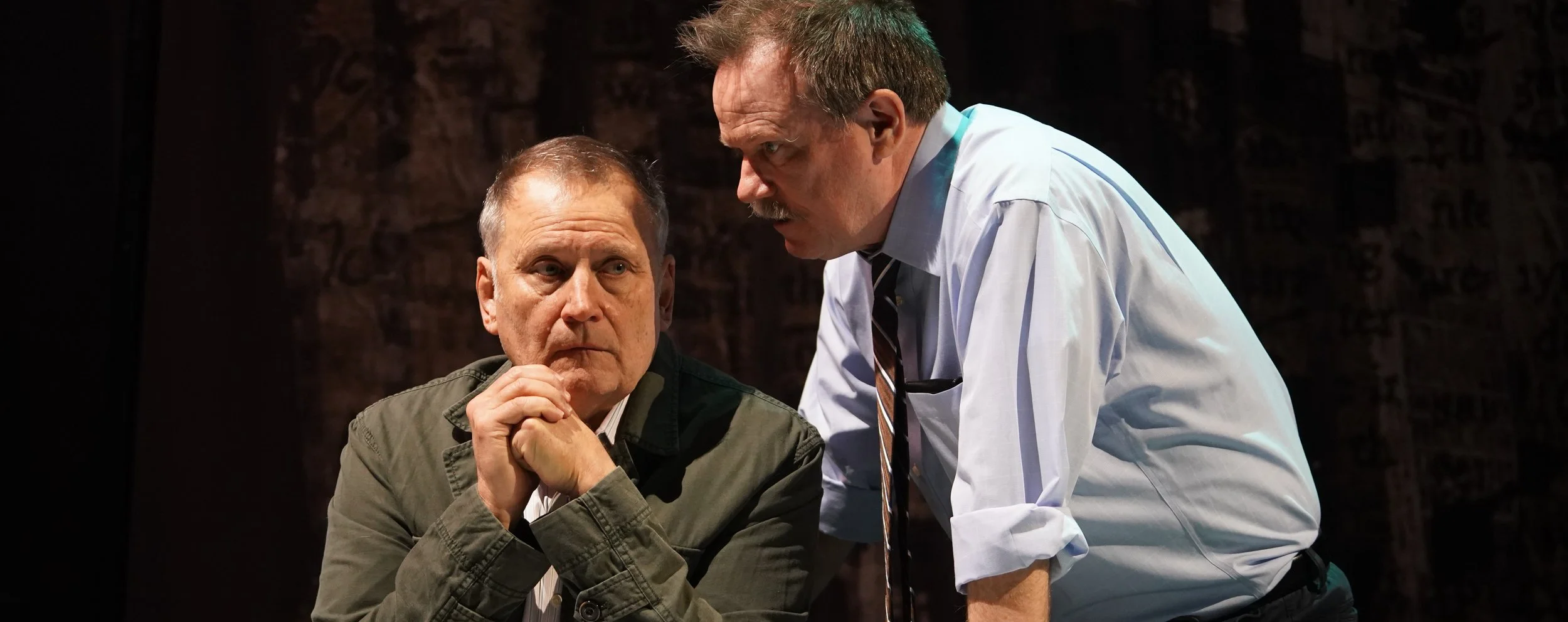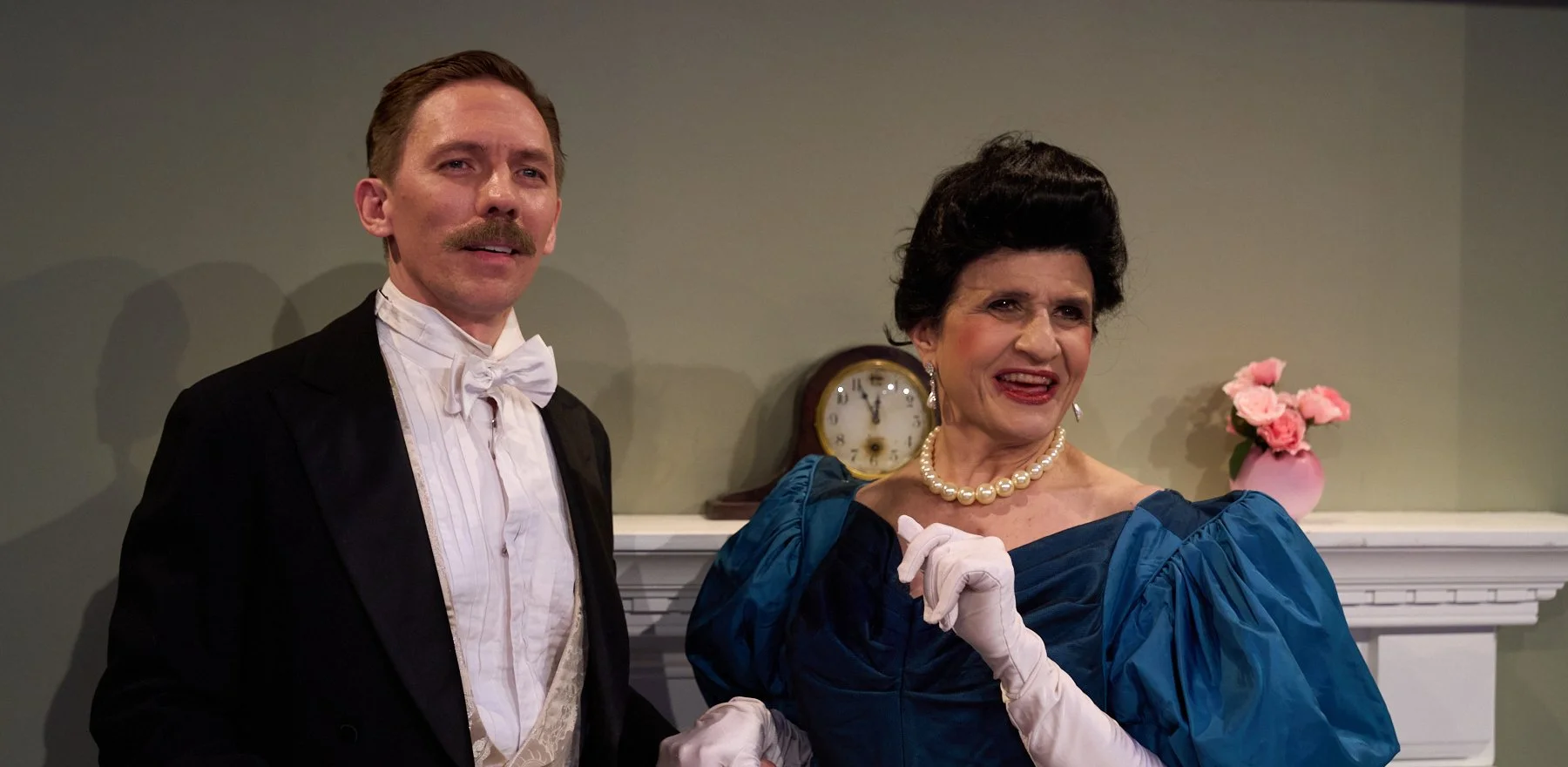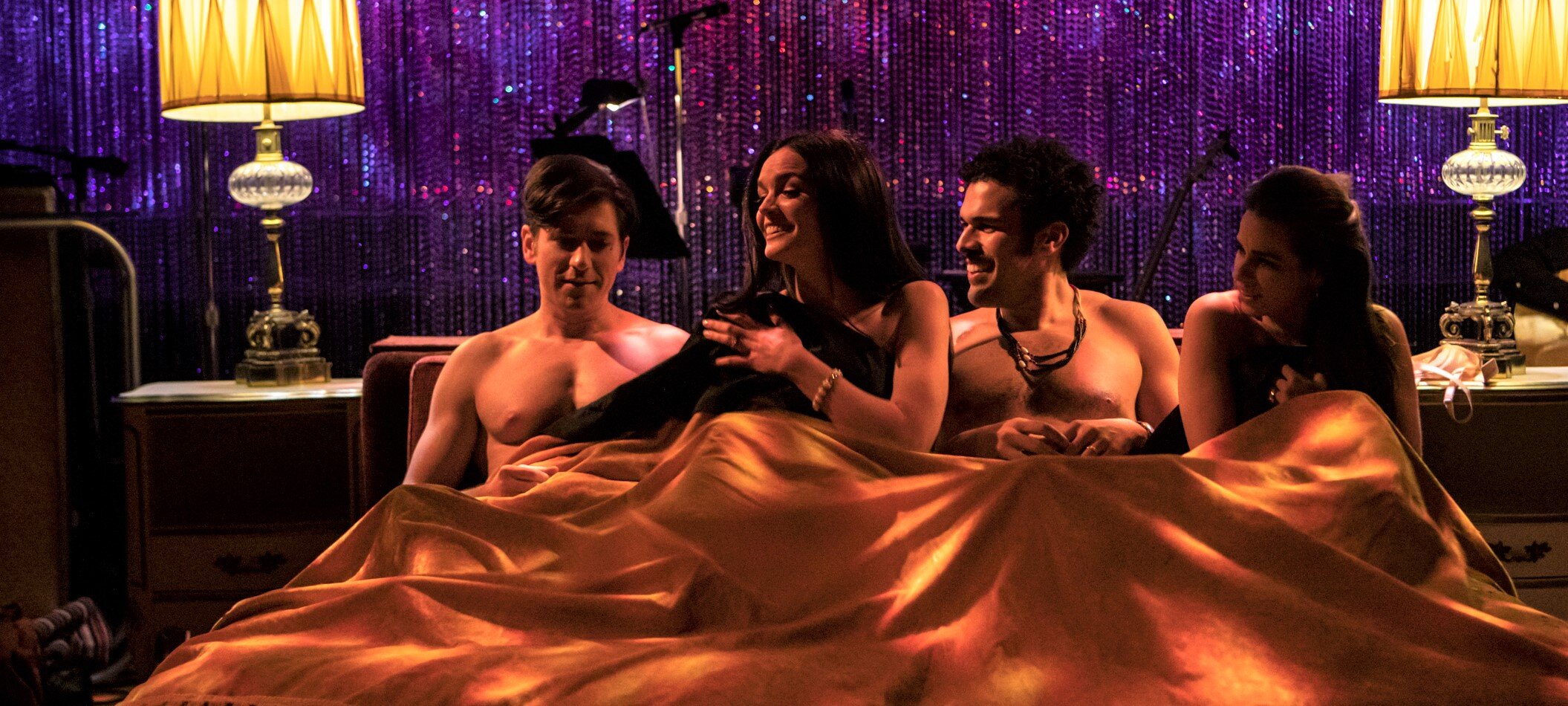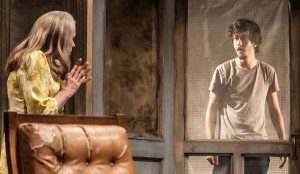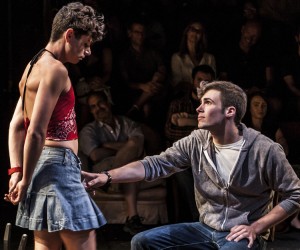How exciting and new the film Bob & Carol & Ted & Alice must have seemed when it hit pre-multiplex screens in 1969. Along with such contemporary classics as Midnight Cowboy and Easy Rider, and with the added inducement of major movie stars wearing few clothes, Paul Mazursky’s satire proffered trendy sex; inspired materialistic adults to question their values; laughed about pot, one of the first big releases to do so; spoofed middle-class mores; and served up newly permissible bare breasts, though not Natalie Wood’s or Dyan Cannon’s. As a time capsule, the movie holds up. But why, in 2020, do a musical version?
Daddy
Psychosexual hang-ups were at the center of Jeremy O. Harris’s Slave Play earlier this season, and they form an important part of Daddy, his newest work. Daddy, too, has an interracial gay relationship at its core, but this time Harris’s interests encompass homophobia, ageism, materialism, parental strife, fundamentalist Christianity, and the philosophy of art.
Horrors in the Heartland
It’s been 20 years since the Broadway revival of Buried Child, and the production by The New Group at the Pershing Square Signature Center suggests that Sam Shepard’s 1978 Pulitzer Prize-winning play has lost some luster. Echoing classic American dramas of dysfunctional families—notably Who’s Afraid of Virginia Woolf? and Long Day’s Journey Into Night—Shepard’s portrait of the American dream gone awry is a post-Vietnam nightmare that combines melodrama and absurdist elements. The latter can try one’s patience, as Shepard hacks away at American mythology with a scythe.
In Derek McLane’s shabby, brownishly-decorated Illinois farmhouse live three people: Dodge (Ed Harris), a sickly, cantankerous, whiskey-swilling patriarch who lounges on a beat-up sofa with a ratty blanket that is every bit as necessary to him as Linus’s in Peanuts. This feeble figure, whose name evokes Dodge City and Western heroism gone to seed, is married to Amy Madigan’s beady-eyed Halie, a woman who is cuckolding him with the local priest, Father Dewis (Larry Pine), who buys her telltale yellow roses. From him, she also wants public support for a statue of their late son Ansel, a basketball “star,” she claims, who died under mysterious circumstances.
A new inhabitant is another son, Tilden, played by Paul Sparks as mentally challenged in the vein of Lennie Small in Of Mice and Men. Tilden has returned home after 27 years in New Mexico; he is generally soft-spoken as well as soft-headed. He finds corn in the backyard when his parents swear nothing grows there, brings it inside and shucks it. Occasionally, he mutters in a shell-shocked way about a secret and something buried in the yard.
Dodge and Halie have a third son, Bradley (Rich Sommer), who uses a wooden leg after a chain-saw accident. Dodge is terrified that Bradley will sneak in and cut his hair while he’s asleep, and indeed, an emasculation in the manner of Samson occurs at the end of Act I. (Shepard’s 1978 version was three acts; in 1996 he reworked the script, and the current production plays without intermission.)
The couple who upset the apple cart, as it were, are Vince, Tilden’s son and the grandson of Dodge and Halie, and his girlfriend, Shelly (Taissa Farmiga); they drop in on his grandparents while traveling cross-country to see Tilden in New Mexico. (Parent-child communications in this family take a beating: Nat Wolff’s Vince hasn't seen his grandparents in six years; and, of course, he has no idea his father has left New Mexico. Moreover, neither father nor grandfather recognizes Vince, let alone remembers him.)
Both McLane’s set and Susan Hilferty’s costumes do a fine job of conveying realism, but much is left unexplained, and one’s suspension of disbelief often strains under Shepard’s symbolism. Why does Vince leave the house to buy liquor and not return till the next morning? Apparently so Shelly can be victimized by the sadistic Bradley and scorned by Dodge and Halie. And when they turn hostile, why doesn’t she explain more quickly that she is their grandson’s girlfriend? Or warn off Bradley before he takes advantage of her? The stage time that it takes for her to use common sense is, as Mark Twain would say, “a stretcher.”
In a climactic moment, when Halie discovers that the backyard has a bounty of vegetables, she yells to Dodge: “Tilden was right about the corn, you know. I’ve never seen such corn… dazzling. Tall as a man already… Carrots, too. Potatoes. Peas.” The idea that a field of high corn would not have been noticed in the backyard defies realism, as does Halie’s mention of potatoes. If she has not seen the corn until now, how can she possibly claim there are potatoes under the earth? But the symbolism of a harvest sprouting from blood and death is the point, not rationality or realism.
Still, in Tilden’s corn-shucking and later, Shelly’s cutting up carrots, director Scott Elliott brings out the humor, although the two younger cast members pale in gravitas and skill compared with the superb veterans. Elliott also creates a terrific sense of febrile menace and poisoned trust. “You think because people propagate they have to love their offspring?” Dodge asks Shelly. “You never seen a bitch eat her puppies?” Life in this American home resembles a dogfight.
Shepard’s cynical view of American ideals and debased notions of national self-esteem were certainly fashionable in the late 1970s. To a large extent they are still hanging around. But Buried Child, for all the vigor of its performances, feels just a bit stale.
The New Group production of Buried Child will play through April 3 at the Alice Griffin Jewel Box Theatre at the Pershing Square Signature Center (480 West 42nd St., between 9th and 10th Avenues) in Manhattan. Evening performances are Tuesday-Friday at 7:30 p.m., and Saturdays at 8 p.m. Matinees are Saturday and Sunday at 2 p.m., and on Wednesdays at 2 p.m. Tickets are $25-$115 and may be arranged visiting www.thenewgroup.org, or through Ticket Central at 212-279-4200, or in person at 416 West 42nd St. (noon to 8 p.m. daily).
Apocalypse Soon
Societies don’t come much more dystopian than that of Philip Ridley’s brutal and Darwinian Mercury Fur. In this vision of the future, staged in traverse by Scott Elliott for The New Group, Ridley posits a world—specifically New York—in the grip of post-apocalyptic violence. Zoo animals have been gunned down in their cages, riots fill the streets, and drugs are plentiful.
Lanky Elliot (Zane Pais) and his dim-witted brother Darren (Jack DiFalco) have been sent to prepare a derelict apartment for a party; they are rearranging overturned, tattered furniture—though even “tattered” seems too stylish a description for the squalor designed by Derek McLane. Bits of white plaster and black chunks are strewn over the floor; the furniture is worn with holes, and graffiti is on the windows.
The preparations are clandestine, and Elliot and Darren are skittish. They are thrown when they discover that one of the apartments in the abandoned building is occupied, by Naz (Tony Revolori, who played the bellboy in the film The Grand Budapest Hotel). Naz has met Elliot, who at one time was known as “butterfly man in the ice cream truck.” Naz traded an artifact he had looted from the Met for some of Elliot’s drugs, peddled in the form of butterflies—and everyone uses them.
Naz is impressed to hear that Elliot and Darren are working for Papa Spinx, a legendary power broker. Darren pleads with Elliot to let the gentle Naz stay and help them. Elliot reluctantly agrees, but such is the sense of dread, fear, and jangled nerves that director Elliott creates that a tense viewer may want to yell, “Get out of there!”
Yet, other characters soon arrive. They include Lola (Paul Iacono), a drag queen who is Elliot’s lover and has been enlisted to prepare a young Asian boy, known as the Party Piece—for the upcoming event. But things don’t go as planned. The Party Guest has pushed up the date and yet is running late. The light is fading, so that Spinx may have trouble filming. (Splendid work by Jeff Croiter encompasses flashlights and candles, fire and dawn.)
When the gruff Spinx (Sea McHale) arrives, he has with him a blind woman dressed in a ball gown and known as the Duchess. Emily Cass McDonnell invests her with delusion and vulnerability that recall a Tennessee Williams character; a highlight is her attempt to sing “Climb Ev’ry Mountain” from The Sound of Music. (Ironically, Darren earlier recalls a memory of the movie his parents loved—about mountains and “do-re-mi.” But that unalloyed symbol of the triumph of good is a barely perceptible memory.)
Last to arrive is the Party Guest (Peter Mark Kendall), who has promised Spinx a good deal of money to stage a gruesome fantasy of his. Elliot, the most intelligent of the characters, is going along with Spinx only because he has to protect Darren and Lola. Elliot alone remembers history. He reads and he knows the past. “His brains are like the guts of a great white shark,” says Darren, who tells Naz, in a ghoulishly comic yet repellently vulgar rendering, the story of John F. Kennedy and his assassination, but mixes Marilyn Monroe and Hitler into the mangled history.
But, it turns out, Darren’s memory was induced by eating a butterfly, which Elliot presses him to describe. “What did it do to you?” Elliot asks. “Famous people … political leaders … killing them,” Darren answers. And Elliot divines, “Assassination. You ate a red with silver stripes.”
Mercury Fur is strong medicine. Although Ridley has a way with dialogue and description, it’s hard to judge whether his play merely wallows in depravity or is a legitimate assessment of mankind’s capacity for evil. Perhaps it’s so disturbing because the behavior of his characters leaves no doubt that any shred of decency will soon be utter moral desolation.
The New Group production of Mercury Fur plays at the Pershing Square Signature Center (480 West 42nd St. between 10th and 11th Aves. in Manhattan) through Sept. 27. Evening performances are at 7:30 p.m. Tuesday through Friday and 8 p.m. on Saturday. Matinees are at 2 p.m. on Saturday and Sunday. For tickets, visit TheNewGroup.org or TicketCentral.com.


